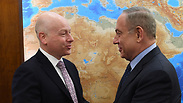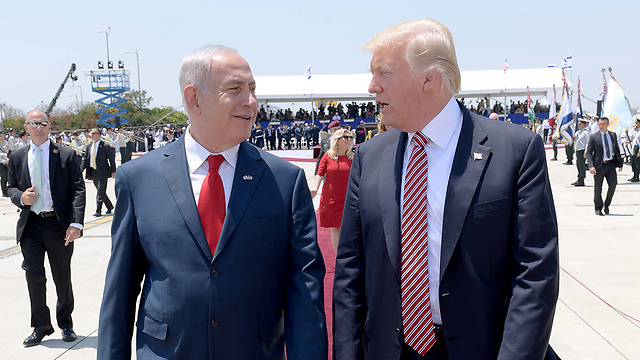
ime Minister Netanyahu with Trump’s Mideast envoy, Jason Greenblatt
Photo: Kobi Gideon/GPO

American plan is to deal with northern Samaria first
Analysis: As part of the big package deal with the Arab world, the Trump administration has raised the idea of transferring lands from Area C to Area B. With his current coalition, however, Netanyahu will likely find it difficult to deliver the minimum that the US has promised the Arabs.
A secret and very politically sensitive tour was scheduled to take place last Thursday, under the media’s radar. Jason Greenblatt,
US President Donald Trump’s Middle East envoy, requested to tour an area in northern Samaria which Israel had evacuated during the 2005 disengagement from Gaza.

The Trump administration has already marked northern Samaria as a possible area for an Israeli move, which would convey to the Arab world that Israel is committed to recognizing the two states. The move involves the transfer of lands that are under full Israeli sovereignty to partial—merely civil—Palestinian sovereignty. In more familiar words, transferring lands from Area C to Area B. The Americans see this move as a possible mission for the Israeli government, as part of the big package deal with the Arab world.
Greenblatt asked Major-General Yoav Mordechai, the coordinator of government activities in the territories, to accompany him on the tour. Mordechai would have never thought of joining the tour without receiving the approval of Prime Minister Benjamin Netanyahu and Defense Minister Avigdor Lieberman, who knew exactly what Greenblatt was checking. So the denials coming out of the Prime Minister’s Office about the Americans raising the possibility of moving lands from Area C to B are far from the truth.

Trump and Netanyahu. Israel may find itself under heavy pressure, which will be exerted by the prime minister’s great friend in the White House of all people (Photo: Avi Ohayon/GPO)
The news that the American administration had raised the idea of handing lands over to civil Palestinian responsibility was leaked to Channel 10 on Wednesday evening, and Greenblatt’s tour of Samaria was called off. The following day, the special envoy met with Netanyahu, and the two likely discussed ideas on the role Israel will play in the deal taking shape in the Middle East.
Greenblatt and his cohorts have already presented to the Saudis, the emirates and the Palestinians what appears in their working papers as “a redefinition of West Bank lands.” They are not talking about definition changes in large areas, but in small areas. Something symbolic that will indicate to the Arab world that Israel is willing to make progress towards the two-state solution not just through words, and that it has no intention to annex all the territories.
Alongside the idea to transfer Samaria lands to Area B, the Americans have raised another idea which was already discussed in the defense establishment around the time Lieberman took office, as part of the “carrots and sticks” policy he spearheaded—“whitewashing” illegal Palestinian construction, which has spilled over from Area B to Area C, to prevent an explosion on the ground. This includes about 20,000 structures in hundreds of different points. Demolition orders have already been issued against 13,000 of them, and 3,500 have been executed. The idea that the army sold to Lieberman was adopted by the Americans, who took it one step further: Israel will both whitewash and declare that Area C lands are being transferred to Area B. It’s not a large territory, and at this stage it will suffice.
The “whitewashing of houses” was presented to the cabinet on the eve of Trump’s arrival as an Israeli gesture towards an unpredictable president. The cabinet ministers, however, distorted the American intention. While they agreed to stop the house demolition for humanitarian reasons, when it comes to transferring Area C lands to Area B—mum’s the word. It seems that the prime minister, with the current coalition, will find it difficult to deliver the minimum that the United States has promised the Arabs.
What the Americans are demanding from the Palestinians seems impossible at the moment too: To bring the security coordination with Israel to light, to stop handing out money to terrorists jailed in Israel, etc. From the Saudis, according to the Wall Street Journal, the Americans demanded initial moves of normalization with Israel, like opening direct telephone lines between the two countries, allowing Israelis to do business in Saudi Arabia and letting Israeli planes fly over Saudi Arabia on their way to the Far East.
Now each side must bring its part to the table. Greenblatt is staying in the region to make sure that no one tries to get out of it. In the next stage, the Americans are planning a summit in Washington, followed by simultaneous negotiations between Israel and the Sunni world, led by Saudi Arabia, and between Israel and the Palestinians. Trump’s close associates are pressing him to hold the summit in Washington within a month, in a bid to present an achievement in the international arena. If this approach is accepted, Israel may find itself under heavy pressure, which will be exerted by Netanyahu’s great friend in the White House of all people.
















